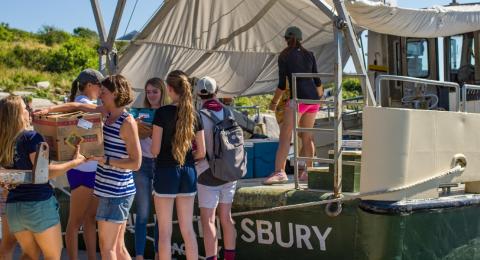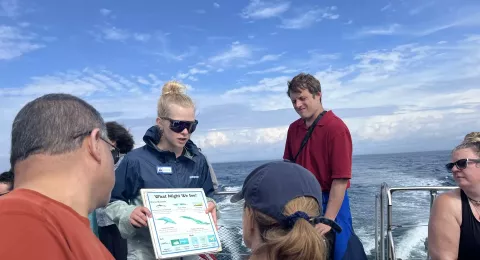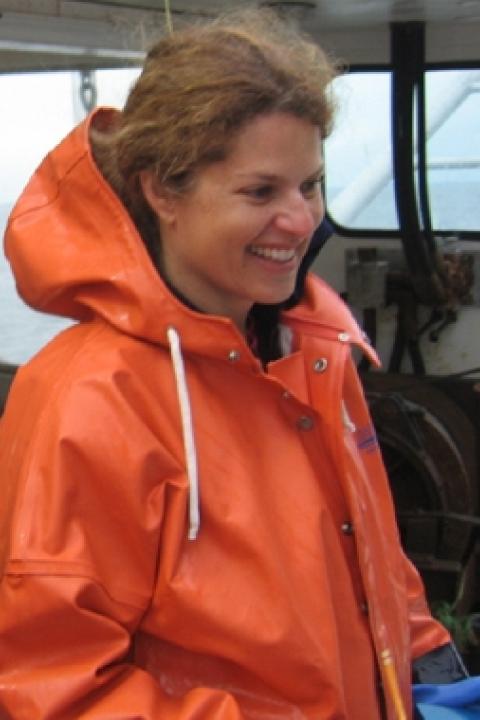The Marine, Estuarine and Freshwater Biology at UNH is a unique opportunity to study aquatic ecosystems and the diverse organisms that inhabit them. The program provides hands-on experience through fieldwork, laboratory research and internships in environments ranging from oceans to rivers. You will gain a deep understanding of ecological processes, conservation strategies and the impact of human activities on aquatic life. This major appeals to students passionate about marine biology, environmental science and conservation.
What is marine, estuarine and freshwater biology?
and freshwater biology is a wide-ranging discipline that covers everything from the smallest aquatic microbes to the largest marine mammals and the habitats that they depend on, as well as emerging opportunities in shellfish, fish and seaweed farming.The program builds on a core curriculum in math, chemistry, physics and biology, and branches out into the aquatic sciences. Students specialize in their own areas of interest, preparing for exciting careers in fields including research, teaching, conservation, restoration, fisheries and aquaculture.
Why study marine, estuarine and freshwater biology at UNH?
State-of-the-art facilities, hands-on learning with an emphasis on undergraduate student research, and an incredible location make UNH the perfect place to study marine, estuarine and freshwater biology. The university is close to the New Hampshire Seacoast, the Lakes Region and the White Mountain National Forest, providing endless opportunities to study aquatic organisms and ecosystems. UNH has aquaculture facilities and coastal and estuarine research laboratories such as Jackson Estuarine Laboratory, Coastal Marine Laboratory and Shoals Marine Laboratory. Together with Cornell University, it administers the summer undergraduate programs at the Shoals Marine Laboratory on Appledore Island off the coast of New Hampshire and Maine.
Potential careers
- Aquariums and ecotourism
- Biotechnology
- Conservation/environmental protection
- Education
- Environmental consulting
- Fisheries/aquaculture/ecological restoration
- Fisheries management
- Research
Curriculum & Requirements
The Major in Marine, Estuarine, and Freshwater Biology is intended to give students interested in the fields of marine and freshwater biology the background and direct hands-on experience needed to pursue productive careers, including potential advanced study. This strategically cross-disciplinary major builds on a broad set of science courses in high-impact areas of study for today’s world, represented by a core curriculum in math, chemistry, physics, and biology. The core background is strengthened by a series of required and elective courses in a diverse range of aquatic sciences spanning watersheds to oceans, providing opportunities for study from organismal to ecosystem scales. Designed to provide a solid foundation of knowledge in freshwater, estuarine, and marine biology, the MEFB Major allows flexibility and encourages students to focus on particular areas of interest from molecular biology to ecosystem and policy studies. Students will have the opportunity to specialize in areas of their own interest, such as aquaculture and fisheries, animal behavior, ecological restoration, or management. While MEFB students must complete rigorous course requirements, our students are encouraged to tailor their elective courses within and across departments and colleges as needed to build their own, unique cross-disciplinary path.
The University of New Hampshire is uniquely located for the study of aquatic organisms and their habitats. We are centered between the Great Bay Estuary and the Gulf of Maine, with easy access to diverse marine environments as well as the freshwater habitats of New Hampshire’s Lakes Region and the White Mountain National Forest. We boast three Marine Laboratories that provide exceptional opportunities for our student’s research and educational needs, including Jackson Estuarine Laboratory (JEL), the Coastal Marine Lab (CML; part of the larger Judd Gregg Marine Research Center), and the Shoals Marine Laboratory (SML), as well as strong affiliations with the Great Bay National Estuarine Research Reserve. While JEL is located on Great Bay in Durham, CML is in nearby New Castle at the Seacoast, and SML is located seven miles off the coast. SML provides summer undergraduate programing with field-based marine courses that fulfill major electives, as well as internships and research opportunities for advanced study. In addition, UNH’s campus maintains two fish aquaculture facilities, a world-class genomics laboratory, and the State Veterinary Diagnostic Laboratory, which provide hands-on opportunities for undergraduates. There is also an active diving program with courses at both beginner and advanced levels. A major strength of the MEFB program is the hands-on approach to learning combined with an emphasis on involving undergraduate students in mentored research opportunities.
Off Campus Coursework and Study Abroad Opportunities
It is strongly recommended that students consider participating in a summer, semester, or year-long study abroad program. UNH’s Shoals Marine Laboratory (https://www.shoalsmarinelaboratory.org/), in conjunction with Cornell University, offers a host of marine biology-related college level courses that meet many degree requirements of the MEFB major over the summer on our island campus in the Isles of Shoals. SML offers both Merit and Need-based Scholarships, multi-course discounts, as well as competitive Research Internships offering summer stipends. UNH Global is the definitive resource for Study Abroad opportunities for undergraduates (https://www.unh.edu/global/education-abroad). UNH Global can provide information on programs of study, while students’ academic advisors can assist in course selection options that provide equivalencies to requirements in MEFB so progress toward degree is not compromised. In addition, Ecoquest, run by the Department of Natural Resources, offers summer and semester programs of environmentally oriented courses in New Zealand (https://ecoquest.unh.edu/). These are just some of the many opportunities available for MEFB students and we encourage you to explore more.
Pre-health Professional Program
MEFB majors who wish to pursue postgraduate degrees in the health care professions should visit the premed advising website (http://www.unh.edu/premed-advising).
Sample Degree Plan
This sample degree plan serves as a general guide; students collaborate with their academic advisor to develop a personalized degree plan to meet their academic goals and program requirements.
| First Year | ||
|---|---|---|
| Fall | Credits | |
| MEFB 401 | Marine Estuarine and Freshwater Biology: Freshmen Seminar | 1 |
| BIOL 412 | Introductory Biology: Evolution, Biodiversity and Ecology | 4 |
| CHEM 403 | General Chemistry I | 4 |
| ENGL 401 | First-Year Writing | 4 |
| Discovery Course | 4 | |
| Credits | 17 | |
| Spring | ||
| BIOL 411 | Introductory Biology: Molecular and Cellular | 4 |
| CHEM 404 | General Chemistry II | 4 |
| BIOL 528 | Applied Biostatistics I | 4 |
| Discovery Course | 4 | |
| Credits | 16 | |
| Second Year | ||
| Fall | ||
| MEFB 503 | Introduction to Marine Biology | 3 |
| CHEM 545 & CHEM 546 | Organic Chemistry and Organic Chemistry Laboratory | 5 |
| Discovery Course | 4 | |
| Discovery Course | 4 | |
| Credits | 16 | |
| Spring | ||
| BIOL 633 | Data Analysis for Life Science | 4 |
| BMCB 658A | General Biochemistry | 3 |
| GEN 604 | Principles of Genetics | 4 |
| Discovery Course | 4 | |
| Credits | 15 | |
| Third Year | ||
| Fall | ||
| MEFB 625 or MEFB 747 | Introduction to Marine Botany or Aquatic Plants in Restoration/Management | 4-5 |
| MEFB 725 | Marine Ecology | 3 |
| PHYS 401 | Introduction to Physics I | 4 |
| Discovery Course | 4 | |
| Credits | 15-16 | |
| Spring | ||
| ZOOL 690 | Evolution | 4 |
| ZOOL 625 & ZOOL 626W | Principles of Animal Physiology and Animal Physiology Laboratory | 5 |
| PHYS 402 | Introduction to Physics II | 4 |
| Animal Survey Course | 4 | |
| Credits | 17 | |
| Fourth Year | ||
| Fall | ||
| MEFB 755 | Biological Oceanography | 3 |
| ZOOL 710 | Sharks and Bony Fishes | 4 |
| Major Elective | 4 | |
| Capstone | 4 | |
| Credits | 15 | |
| Spring | ||
| Major Elective | 4 | |
| Major Elective | 4 | |
| Elective | 4 | |
| Elective | 4 | |
| Credits | 16 | |
| Total Credits | 127-128 | |
Degree Requirements
All Major, Option and Elective Requirements as indicated.
*Major GPA requirements as indicated.
Major Requirements
A minimum grade of C- is required in all biological science courses that are counted toward the requirements for a degree in MEFB. Students who expect to compete successfully for post-baccalaureate programs should attain a cumulative GPA of 3.0 or higher by the end of the sophomore year and maintain it at that level.
| Code | Title | Credits |
|---|---|---|
| MEFB Core | ||
| BIOL 412 | Introductory Biology: Evolution, Biodiversity and Ecology | 4 |
| BIOL 411 | Introductory Biology: Molecular and Cellular | 4 |
| MEFB 401 | Marine Estuarine and Freshwater Biology: Freshmen Seminar | 1 |
| MEFB 503 | Introduction to Marine Biology | 3 |
| MEFB 725 | Marine Ecology | 3 |
| ZOOL 690 | Evolution | 4 |
| GEN 604 | Principles of Genetics | 4 |
| CHEM 403 | General Chemistry I | 4 |
| CHEM 404 | General Chemistry II | 4 |
| CHEM 545 & CHEM 546 | Organic Chemistry and Organic Chemistry Laboratory | 5 |
| BMCB 658A | General Biochemistry | 3 |
| MATH 424B | Calculus for Life Sciences | 4 |
| or BIOL 428 | Quantitative Biosciences | |
| or BIOL 633 | Data Analysis for Life Science | |
| or BIOL 706 | Data Science with R for the Life Sciences | |
| or BIOL 711 | Experimental Design & Analysis | |
| BIOL 528 | Applied Biostatistics I | 4 |
| PHYS 401 | Introduction to Physics I | 4 |
| PHYS 402 | Introduction to Physics II | 4 |
| Choose one Plant Survey course: | ||
MEFB 625 | Introduction to Marine Botany | |
MEFB 747 | Aquatic Plants in Restoration/Management | |
| Choose one Systems course: | 3-4 | |
MEFB 717 | Lake Ecology | |
MEFB 755 | Biological Oceanography (C) | |
ZOOL 708 | Stream Ecology (C) | |
| Choose one Physiology/Function course: | 4-5 | |
ZOOL 625 & ZOOL 626W | Principles of Animal Physiology and Animal Physiology Laboratory | |
MEFB 773 | Physiology of Fishes | |
| Choose one Animal Survey course: | 3-4 | |
MEFB 628 | Marine Invertebrate Evolution and Ecology | |
MEFB 675 | Marine Mammal Biology and Conservation | |
ZOOL 542 | Ornithology | |
ZOOL 710 | Sharks and Bony Fishes | |
| Capstone: | ||
BIOL 780 | Capstone Companion Course | |
| MEFB Electives 1 | ||
| Select three courses from the following: | ||
ANSC 701 | Physiology of Reproduction | |
BIOL 566 | Systematic Botany | |
BIOL 706 | Data Science with R for the Life Sciences | |
BIOL 720 | Plant-Animal Interactions | |
BMCB 605 | Principles of Cell Biology | |
BMS 503 & BMS 504 | General Microbiology and General Microbiology Laboratory | |
ESCI 501 | Introduction to Oceanography | |
GEN 713 | Microbial Ecology and Evolution | |
MARI 705 | Introduction to Marine Policy: Understanding US Ocean, Coastal and Great Lakes Policy | |
MEFB 505 | Introduction to Applied Science Communication (SML) | |
MEFB 506 | Marine Parasitology and Disease (SML) | |
MEFB 508 | Marine Ecosystem Research and Management (SML) | |
MEFB 510 | Field Ornithology (SML) | |
MEFB 530 | Evolution and Marine Diversity (SML) | |
MEFB 535 | Marine Mammal Biology (SML) | |
MEFB 590 | Coastlines in Crisis | |
MEFB 625 | Introduction to Marine Botany | |
MEFB 628 | Marine Invertebrate Evolution and Ecology | |
MEFB 674 | Ecology and Marine Environment (SML) | |
MEFB 675 | Marine Mammal Biology and Conservation | |
MEFB 702 | Sustainable Marine Fisheries (SML) | |
MEFB 714 | Field Animal Behavior (SML) | |
MEFB 717 | Lake Ecology | |
MEFB 741 | Sharks: Biology and Conservation (SML) | |
MEFB 747 | Aquatic Plants in Restoration/Management (C) | |
MEFB 751 | Research in Biology at the Shoals Marine Lab (SML) | |
MEFB 754 | Anatomy and Function of Marine Vertebrates (SML) | |
MEFB 755 | Biological Oceanography (C) | |
MEFB 772 | Fisheries Biology: Conservation and Management | |
MEFB 773 | Physiology of Fishes | |
NR 504 | Freshwater Resources | |
NR 703 | Watershed Water Quality Management | |
NR 712 | Mammalogy | |
NR 744 | Biogeochemistry | |
ZOOL 518 | Comparative Morphology and Biology of Vertebrates | |
ZOOL 542 | Ornithology | |
ZOOL 610 | Principles of Aquaculture | |
ZOOL 625 & ZOOL 626W | Principles of Animal Physiology and Animal Physiology Laboratory | |
ZOOL 690 | Evolution | |
ZOOL 710 | Sharks and Bony Fishes | |
ZOOL 708 | Stream Ecology (C) | |
ZOOL 733W | Behavioral Ecology (C) | |
ZOOL 736 | Genes and Behavior (C) | |
ZOOL 740 | Acoustic Ecology (C) | |
ZOOL 777W | Neuroethology (C) | |
| Research and Special Projects 2 | ||
| Select from the following Courses: | ||
BIOL 795 | Independent Investigations in Biology | |
BMS 795 | Investigations in Biomedical Science | |
BIOL 799H | Honors Senior Thesis (C) | |
MEFB 403 | Investigative Marine Biology Laboratory (SML) | |
MEFB 730 | Underwater Research (SML) | |
MEFB 751 | Research in Biology at the Shoals Marine Lab (SML) | |
MEFB 795 | Independent Investigations in Marine, Estuarine, and Freshwater Biology | |
TECH 797 | Undergraduate Ocean Research Project (C) 3 | |
MEFB 799H | Honors Senior Thesis in Marine, Estuarine, and Freshwater Biology (C) | |
- 1
A single course cannot be used for both a core requirement and an elective (e.g., ZOOL 542 cannot be used to fulfill the animal survey requirement and as an elective).
- 2
Primary focus of the project must be Marine, Estuarine and/or Freshwater. A 600, 695, 795, or 799 experience may substitute for one elective with academic advisor approval, but only if taken for at least four credits. These four credits may be spread over multiple semesters if they are consecutive and with the same faculty mentor.
- 3
This class requires enrollment in both fall and spring sections, 2 credits/semester for a total of 4 credits.
Capstone Experience
As part of the University of New Hampshire’s Discovery Program requirements, all students must complete a capstone experience during their senior year (after earning at least 90 credits). The capstone experience for students majoring in MEFB consists of BOTH (1) an approved individual experience AND (2) the successful completion of the BIOL 780 Capstone Companion Course. Students will not be approved for graduation until capstone certification has been granted.
1) The individual experience
The individual experience may be satisfied through various forms of experiential learning (e.g., Honors thesis, mentored research project, internship) or a course denoted with a “(C)” in the courses listed above. The individual experience must fulfill at least one of the University’s capstone criteria:
- synthesizes and applies disciplinary knowledge and skills
- fosters reflection on undergraduate learning and experience
- demonstrates emerging professional competencies
- applies, analyzes, and/or interprets research, data, or artistic expression
- explores areas of interest based on the integration of the prior learning
Before beginning any capstone individual experience, students must submit a completed capstone approval form to their Program Coordinator.
Students can obtain this form on the Department's Capstone page or from their Program Coordinator. Here they will describe their proposed individual experience and how it fulfills at least one of the University’s capstone criteria listed above. If the student is selecting a “C” course for their individual experience, they should obtain the course syllabus from the instructor for information about the course’s content and learning objectives.
2) Enrollment in BIOL 780 Capstone Companion Course
Students will also be required to enroll in BIOL 780 (1 cr.) during the semester of their individual experience. BIOL 780 is offered every Fall and Spring semester.
- If the individual experience is a two-semester thesis, BIOL 780 should be taken during the second semester.
- If the individual experience occurs during the summer (e.g., internship), BIOL 780 should be taken during the Fall semester that immediately follows.
-
Note: Because BIOL 780 is not offered during the summer, students cannot complete their individual experience during the summer and graduate during that same September. Summer experiences could only be used as individual capstone experiences if completed the summer before the student’s senior year.
Program Learning Outcomes
Students will be able to:
- Show the ability to synthesize diverse sources of information and communicate it effectively.
- Demonstrate a broad understanding of the unique characteristics, as well as the similarities, governing freshwater, estuarine and marine systems.
- Have a broad understanding of biology from the molecular to the ecosystem with a particular appreciation for the abiotic and biotic factors relating to diverse aquatic ecosystems.
- Demonstrate the ability to describe basic principles of scientific inquiry and the importance of scientific study for understanding the natural world.
- Demonstrate the ability to design and experiment, collect data, analyze and graph it appropriately, and summarize the significant findings.
- Demonstrate an ability to critically and objectively evaluate data, develop hypotheses, plus interpret biological experiments and studies.
- Demonstrate an ability to communicate clearly and explicitly, both orally and in writing, following conventional scientific formats.
- Demonstrate a broad understanding of major groups of prokaryotic and eukaryotic aquatic life.
Explore Program Details
Marine, Estuarine and Freshwater Biology (MEFB) Curriculum
You really can’t go wrong with a major in the Department of Biological Sciences! That said, MEFB faculty span a number of departments and disciplines and designed the major to be 1) rigorous, 2) diverse, and 3) marketable. Meaning, we want to train a cohort of self-selecting, talented students interested in marine, estuarine, and freshwater biology, taking advantage of UNH’s uniquely direct access to these habitats and the organisms that depend upon them. Graduates of MEFB are highly trained and qualified candidates in a diversity of related job and postgraduate markets.
Minoring is encouraged in MEFB. Current students have minored in a wide range of topics, including Zoology, Animal Behavior, Sustainability, Marine Policy, Plant Biology, Economics, Foreign Language, and more. Minors do not need to be situated in the Biology Department. Suitability of Minors should be a conversation between students and the major advisor.
Class size varies of course. In your Freshman year, there will be a mix of often larger classes in subjects critical to many majors (Intro Biology, for example). But there are moderately sized courses as well on campus. Plus all incoming Freshman take a MEFB-specific seminar limited to your incoming MEFB cohort. That’s a great opportunity to meet MEFB affiliated faculty and graduate students in an open and welcoming informal seminar format.
We in the Biology Department pride ourselves on interactive, experiential, hands-on learning. This teaching philosophy translates strongly in MEFB, in both introductory and advanced course opportunities on campus and beyond. Our faculty seek immersive opportunities throughout the school year, rain or shine.
MEFB continues to be a growing major. Increasing awareness of climate-related disruptions, coupled with increased opportunities for related research funding, has coalesced around this major and the disciplines it spans. There are roughly 110 students declared in MEFB presently at UNH and evidence suggests that number will continue to grow as it has for the past 5 years.
UNH and Biology Department recognizes there are all types of students, with all types of strengths and skills. Passion for the subject matter will drive students to success but aptitude is critical in that process, particularly considering the rigor of the MEFB major. We have seen students with widely variable skillsets succeed and encourage all to do the same. Close coordination and communication with your major advisor is paramount to tracking your trajectory and positing yourself to success. We are here to discuss and consult as you make your decisions. We will offer recommendations and guidance as needed.
The degree requirements are straight forward. Like other majors, the degree mandates several requirements and a series of electives to choose from throughout your program. Please note that electives may be selected from departments including, but not limited to Biological Sciences. Many students elect to take electives from other departments within the college: ANFS, NREN and MCBS, as well as at the Shoals Marine Lab, but many other departments and programs offer suitable options for degree elective fulfillment.
Following a sequential pathway for courses that have pre-requisites is naturally required, for example, and there are some advantages to trend towards following the path most take. These advantages may include having a common peer cohort going through similar experiences and coursework, as well as simplifying the decision-making process. However, not all the courses have to follow a set sequence and there are many pathways to success.
All MEFB-declared Freshman take a MEFB-specific seminar limited to your incoming MEFB cohort. That’s a great opportunity to meet MEFB affiliated faculty and graduate students in an open and welcoming informal seminar format. The MEFB Seminar is a springboard to get to know faculty and learn about their projects, research interests, and opportunities for undergraduate experiences in their labs.
Typically, students tend to get into the classes they want and need. Establishing a graduation plan with your advisor is an important step in this process and of course, registering for classes on time during the pre-determined registration window is essential.
Your major advisor is assigned to you by the Department. If you major in MEFB, your advisor is most likely a faculty member who strongly affiliates and/or teaches courses in that major. There is some flexibility in re-assigning major advisors if desired, but that is uncommon. We’re all here to help you succeed – and some students seek advice from more than one faculty person.
The Capstone Experience is required during your senior year (or the summer prior). The Capstone explores areas of interest-based on the integration of prior learning with focused skill-building experiences. Capstones may be satisfied through created work or products, various forms of experiential learning (e.g., Honors thesis, mentored research project, internships, study abroad, or other special student activity agreed upon by undergraduate advisor). The Hamel Center for Undergraduate Research is an excellent resource of campus-based research opportunities for MEFB students.
Transfer of credits is completed on a case-by-case basis. Every effort is made to account for the valuable work you have completed before transferring to UNH. To assist evaluators in this process, you should be sure to have the course description and syllabus for each course being considered.
MEFB Resources
There are roughly 20 faculty that formally affiliate with MEFB. Eight of us call the Department of Biological Sciences our home, but others span the other three departments within the College of Life Sciences and Agriculture, as well as, the School of Marine Science and Ocean Engineering primarily. This diversity allows our faculty to offer exceptional expertise and learning opportunities for our students that simply could not be found in one department or program!
The opportunities are many, and UNH faculty stand out as priding themselves on creating meaningful experiences for students in their research (lab, field or otherwise). Virtually every faculty member has undergraduates participating in their research in the Biology Department.
Positions include paid and unpaid internships, research independent studies, hourly and work-study positions, as well as some volunteer opportunities. The MEFB Seminar (required of all incoming MEFB majors) is a springboard to get to know faculty and learn about their projects and research interests. We encourage all to seek out any and all such opportunities for experience and personal growth.
We boast three Marine Laboratories that provide exceptional opportunities for our student’s research and educational needs, including Jackson Estuarine Laboratory (JEL), the Judd Gregg Marine Research Complex, a.k.a. Coastal Marine Laboratory (CML), and the Shoals Marine Laboratory (SML) as well as strong affiliations with the Great Bay National Estuarine Research Reserve. While JEL is located on Great Bay in Durham, CML is in nearby Newcastle at the Seacoast, and SML is located six miles off the coast. SML provides summer undergraduate programming with field-based marine courses that fulfill major electives, as well as internships and research opportunities for advanced study.
In addition, UNH’s campus maintains three fish aquaculture facilities, a world-class genomics laboratory (Hubbard Center for Genome Studies), and the State Veterinary Diagnostic Laboratory, which provide hands-on opportunities for undergraduates. Finally, we have 2 research vessels as well as numerous small boats to conduct field-based research.
Absolutely. We have a number of competitive departmental and university-wide scholarships available for MEFB majors to consider. The Department of Biological Sciences maintains a standing committee of faculty and staff specifically charged to solicit many of these scholarship opportunities. In addition, there are a number of scholarships specifically for MEFB courses offered at Shoals Marine Laboratory in the summer. Again, we are here to help you succeed.
Study Abroad And Distance Learning
Absolutely. If you plan to study abroad, you should consult with your major advisor to help plan the most efficient path forward sooner than later. UNH Global is the definitive resource for Study Abroad opportunities for undergraduates We are all here to help you explore and succeed.
In addition to programming through UNH Global, we have a number of Study Abroad programs that are well-suited to MEFB students. Ecoquest, run by the Department of Natural Resources, offers summer and semester programs of environmentally oriented courses in New Zealand. Meanwhile, UNH’s Shoals Marine Laboratory offers shorter-term study-away programs in the summer. These are just some of the many opportunities available for MEFB students and we encourage you to explore more.
How would UNH-MEFB courses run should we need to continue with, or return to, distance learning?
Students in the MEFB program have continued to take courses, including laboratory courses, during the Spring 2020 semester. Faculty and Teaching Assistants have been working overtime to continue to offer as high-quality experience as a student would receive in person. While some things are missing from a virtual experience, there are actually quite a few marine-based modules that can be accessed virtually. We are working hard, together with the UNH administration, to ensure that the trajectories of all undergraduate students are not derailed by the adventures of online learning.
MEFB Culture
Your first MEFB student network is inherently linked to the Freshman Seminar. This required course of first-year MEFB-declared majors gives you weekly exposure to your peers (as well as MEFB-affiliated faculty and graduate students). For many, this becomes an important network. Other Networks form from taking other courses together, especially courses with lots of field and research training, such as our summer offerings at Shoals Marine Laboratory. Many students also find common ground through campus-based clubs like the UNH subunit of the American Fisheries Society or the Aquaculture Club. There are many pathways that exist, and we encourage you to join us and develop new ways to connect!
One great way to get to know current MEFB students is to attend our upcoming ASVD Virtual Conference – April 16, 2020, 2-3 pm EST and April 17, 2020, 3-4 pm EST. MEFB students will be online and ready to share their experiences and answer your questions.
My Future
The timing is great for MEFB grads to join the workforce or continue on to graduate studies or paid internships. Our grads work in many fields across diverse disciplines, with employers such as local state and federal agencies, NGO’s, aquaria, research think-tanks, environmental consulting, and graduate schools, among many more.
As part of the University of New Hampshire’s Discovery Program requirements, all students must complete a capstone experience during their senior year (after earning at least 90 credits).
For students in catalog years AY 20-21 and earlier, capstones may be satisfied through created work or products, various forms of experiential learning (e.g., Honors thesis, mentored research project, internships, study abroad, or other special student activity agreed upon by undergraduate advisor). The Hamel Center (https://www.unh.edu/undergrad-research/) is an excellent resource of campus-based research opportunities for MEFB students. In addition, several specialized courses may also count as capstones, as denoted by “(C)” in the course catalog. Students should consult with their advisor to determine the activities that satisfy this requirement.
Capstone Designation Form
For students in catalog years AY 21-22 and later, the capstone requirements have changed. Learn More
Students interested in the Marine, Estuarine and Freshwater Biology major may also be interested in the following advanced degrees at UNH. Students in the program also have the opportunity to participate in the UNH accelerated master’s program.
Coastal Policy, Graduate Certificate
Ocean Engineering: Ocean Mapping M.S.
Ocean Mapping Graduate Certificate



















